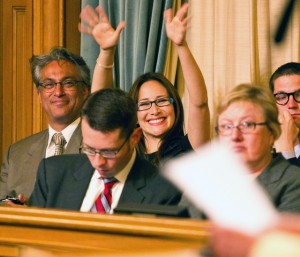by Laird Harrison and Jon Brooks

We fully understand that many San Franciscans would rather repeatedly watch last year's video of Buster Posey getting his leg broken than delve further into the Ross Mirkarimi situation. But it appears, even after last week's climax of a vote to deny the mayor's move to oust the sheriff from office, that the old Yogi Berra maxim of "It ain't over till it's over" is going to apply for the foreseeable future.
Last Wednesday, for instance, San Francisco DA George Gascon called on Mirkarimi to recuse himself from any official duties related to domestic violence, saying that "at a minimum," he is "incapable of adequately performing the functions of his office that relate to crimes of domestic violence." Meanwhile, Supervisor Jane Kim, one of the four votes on the Board against removing Mirkarimi from office, issued a statement on her web site that "the electorate has every right to recall the Sheriff, an action which I would support." Supervisor Malia Cohen, who voted for removal, has said she would also support a recall. And the Chronicle reported that Tony Winnicker, Ed Lee's former press secretary and a current mayoral adviser, called Mirkarimi a "wife-beater" on his Facebook page. Winnicker also sent Supervisor Christina Olague, who was appointed by Lee but failed to reward her political patron with a "Yes" vote on ousting the sheriff, a nasty text:
"As your constituent, you disgust me," the Chron reports Winnicker as saying. "You are the most ungrateful and dishonorable person ever to serve on the board. You should resign in disgrace." Mirkarimi, for his part, didn't exactly tamp down the rhetoric on his appearance on KQED Public Radio's Forum show last week when he made the following statements about some of the institutional forces that have both prosecuted and lobbied against him:
"To this day, nobody from the domestic violence agencies, nobody from the police department, district attorney, has ever reached out... [to] the very person they claimed to defend, the very person that they have tried to use," Mirkarimi said, alluding to his wife, Eliana Lopez. "The narrative that Eliana has not fallen into is what's bothered them, which is why I think they've intensified their attacks." (Lopez herself wrote in a San Francisco Chronicle piece in April that "From the beginning, my public voice has been ignored and treated as irrelevant.")